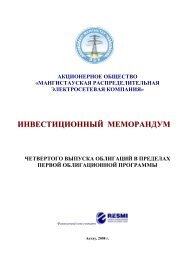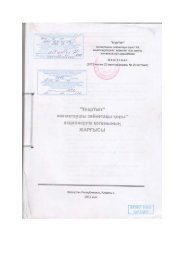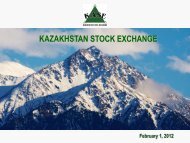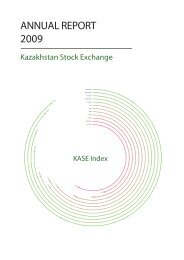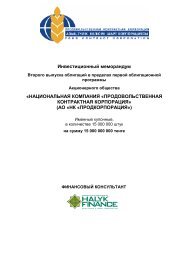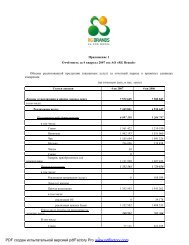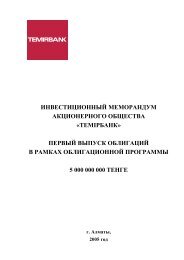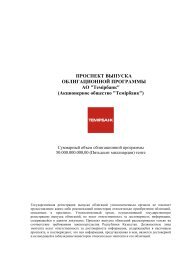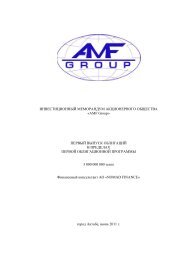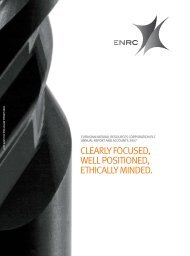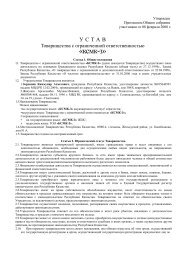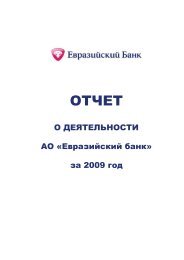JPMorgan - KASE
JPMorgan - KASE
JPMorgan - KASE
You also want an ePaper? Increase the reach of your titles
YUMPU automatically turns print PDFs into web optimized ePapers that Google loves.
Exports<br />
General<br />
In 2001, the export of hydrocarbons and minerals accounted for 58% of Kazakhstan’s total<br />
exports, which totaled $8.6 billion, were oil and gas condensate. Despite Kazakhstan’s substantial<br />
hydrocarbon resources, the production and export of hydrocarbons has been constrained by<br />
Kazakhstan’s land-locked position and its significant dependence on Russia’s transportation<br />
network. Russia retains the right to suspend and impose restrictions on the flow of Kazakhstan’s<br />
oil into the Russian transportation network and Russian enterprises have priority access to<br />
Russian export terminals. Russia imposes an annual quota on Kazakhstan’s exports through<br />
Russia, which is currently set at 121 million barrels, excluding the CPC of which 102.6 million<br />
barrels will be transported via the Atyrau-Samara pipeline and 18.3 million barrels through the<br />
Makhachkala-Novorossiysk route. Kazakhstan has also been invited to participate in the<br />
development of other export routes, including Russia’s Baltic Pipeline System, the Bourgas-<br />
Alexandropolis pipeline and the integration of the Druzhba and Adria pipelines. Modernization<br />
of the Atyrau-Samara pipeline, conducted in 2000, boosted that pipeline’s annual throughput<br />
capacity from about 7.3 billion barrels to about 10.9 billion barrels.<br />
Other export outlets will be needed in order for Kazakhstan to realize the full economic<br />
potential of its oil and gas reserves. The Government and the Company are participating in<br />
several projects to diversify export routes and to expand export capacity.<br />
The Caspian Pipeline Consortium<br />
The CPC was established for the purpose of developing a 1,500 kilometer export pipeline from<br />
the Tengiz oil field to the Russian seaport of Novorossiysk on the Black Sea, together with oil<br />
pumping stations and oil storage and loading facilities. The CPC was formed in July 1992 by<br />
Russia, the Sultanate of Oman, Kazakhstan and a number of international oil companies.<br />
In April 1996, CPC members and a group of eight oil companies signed a protocol on<br />
restructuring the CPC, which called for the oil companies to provide all of the new capital for the<br />
completion of the pipeline in return for 50% ownership of the overall project. The Russian,<br />
Kazakhstani and Oman governments agreed to reduce their stakes in the CPC to 24%, 19% and<br />
7%, respectively. The other shareholders of the CPC are Chevron Caspian Pipeline Consortium<br />
Company (15%), LukArco B.V. (a joint venture between LukOil and Arco) (12.5%), Rosneft-Shell<br />
Caspian Ventures Ltd. (a joint venture between Rosneft and Shell) (7.5%), Mobil Caspian Pipeline<br />
Consortium Company (7.5%), BG Overseas Holdings Ltd. (2%), Agip International (N.A.) N.V.<br />
(2%), Oryx Caspian Pipeline Ltd. (1.75%) and Kazakhstan Pipelines Ventures L.L.C. (1.75%).<br />
A consortium comprising the American company, Fluor Daniel, and Giprovostokneft Institute<br />
from Russia, have the contract to build the pipeline. The first stage of construction of a pipeline<br />
with a capacity of 205 million barrels per year was completed and is expected to be fully<br />
operational by the end of the second quarter of 2003. The second stage to expand the capacity<br />
of the pipeline up to 490 million barrels per year is expected to take up to three years.<br />
Oil Swaps<br />
In 1997, Kazakhstan and Iran entered into a ten-year oil swap agreement. Under its terms,<br />
Kazakhstan has the right to ship 15 million barrels of oil per year to Iran for the first two years of<br />
the agreement, increasing to 44 million barrels annually by the sixth year. The oil is to be shipped<br />
via the Caspian Sea to refineries in Tehran and Tabriz for refining and distribution in the<br />
northern Iranian provinces. Iran, in turn, will supply equivalent amounts of Iranian oil from the<br />
Persian Gulf to customers of Kazakhstan.<br />
The United States prohibits American companies from purchasing or selling Iranian oil. Further,<br />
there have been technical problems refining the oil in Iran associated with the high sulphur<br />
content of the oil received. As a result, there has been little progress to date with the Iranian<br />
swaps. Kazakhstan has delivered only a trial shipment of 461,790 barrels of its oil.<br />
C-2




